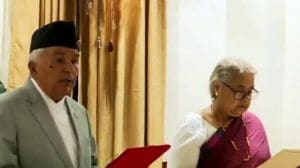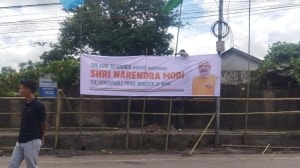‘We are committed to our youth manifesto’
Dr Pramilla Senanayake, Assistant Director-General of the International Planned Parenthood Federation (IPPF), which provides reproductive he...

Dr Pramilla Senanayake, Assistant Director-General of the International Planned Parenthood Federation (IPPF), which provides reproductive health services in 180 countries including India, was in New Delhi recently. She talks to Shree Venkatram about IPPF’s commitment to youth and women, how it attempts to reach out to them, and how a drastic cut in financial assistance from the US government has affected its work worldwide. Extracts:
• Please explain the aim with which IPPF provide reproductive health services and contraceptives to the youth, especially teenagers?
IPPF has a strong commitment to working with the youth. Just look at the global statistics: there are around 1,553 million youth, that is, people in the 10-24 age group, in the world today. Of these Asia hosts the largest number — 957 million.
Research shows that women the world over are having sex at a younger age than their mothers did. Many of them enter a sexual relationship before the age of 18. Each minute an African child dies of AIDS and 14 million less tha 15 years are orphaned by AIDS. The IPPF believes that the reproductive and sexual needs of the youth should be met. We have to stop looking at young people as recipients and instead see them as actors and empower them to participate in decisions affecting their lives.
• How do you get societies to do that?
We have to educate adults to listen to the voices of young people. Understand better how they are socialised into their sexuality and start addressing young people’s sexuality at an earlier age. There is no running away from the fact that people today are having sex at a younger age. We have to accept them as sexual beings. Openness on sexuality does not lead to sexual activities. When we talk to parents and teachers, they confess that they have no idea how to tackle the need of their children.
• But isn’t the IPPF deciding what the youth need?
In IPPF, the youth are very much part of the decision-making process. We have a strong youth component in our governing body, which is drawn up from various member countries. In 1998 IPPF adopted a youth manifesto, which was drafted at a youth parliament where 50 countries had participated. This is the document IPPF is committed to implement. Moreover, 6 of our 30 member-strong governing body are under 25 years of age.
• Tell us of some innovative approaches that IPPF has undertaken to reach out to youth outside the formal school system.
We feel religious leaders can play an important role in reaching out to the young. By involving religious leaders in Indonesia, Thailand and Pakistan, we have been able to talk to the youngsters about contraception.
Street children find a leader among their own. It is easy to reach out them in an effective way through their leaders. In the Caribbean, we have a situation where a young man must have a child by his girlfriend to establish his masculinity. He then leaves her and moves on. The girl gets thrown out by her family because they do not have enough resources to look after her and her baby because of poverty. She is forced to find another man who will look after her and so usually by the age of 20 she may have three or more children.
By providing training for pregnant mothers and creche facilities, we give women the choice of not getting involved in a relationship and have more babies. We found that the number of teenage mothers fell because women who are independent were less likely to get into exploitative relationships. There is a relationship between income and pregnancy.
IPPF, along with BBC, broadcasts a programme called Sex Wise in South Asia where people can write or telephone in to seek answers to questions. This is a popular programme and, interestingly, we found that it is the older people who were asking a lot of questions. Their knowledge about sex and sexuality is very limited.
• The US government has stopped giving funds to your organisation for the reason that it promotes abortions. Does IPPF advocate abortions as a means of family planning?
We do not advocate abortions as a means of family planning. We help women who come to us after unsafe abortions. We provide emergency contraception especially for young people. They are in the forefront of all our programmes.
• How has the cut in US funding affected your work?
The US has double standards. While it allows its women to go in for abortion, it denies other women from doing so. We have had a cut of $8 million a year; the United Nations Population Fund has had a cut of $34 million. IPPF affiliates in different countries who were getting separate funding from the US have lost it too. Because of this, the number of unsafe abortions has gone up.
Poor women who earlier had access to safe abortion facilities are now being driven to backstreet abortions, and their lives are at risk. Fourteen clinics that provided safe abortion services and contraceptives have had to be shut down in Bangladesh. Many clinics have been closed in Egypt and Yemen.
• What are going to be your focus areas of work in the coming years?
We will be addressing the tragedy of unsafe abortion, provide services for young people so that they can save themselves from HIV AIDS and give choices to women.
Photos





- 01
- 02
- 03
- 04
- 05


























